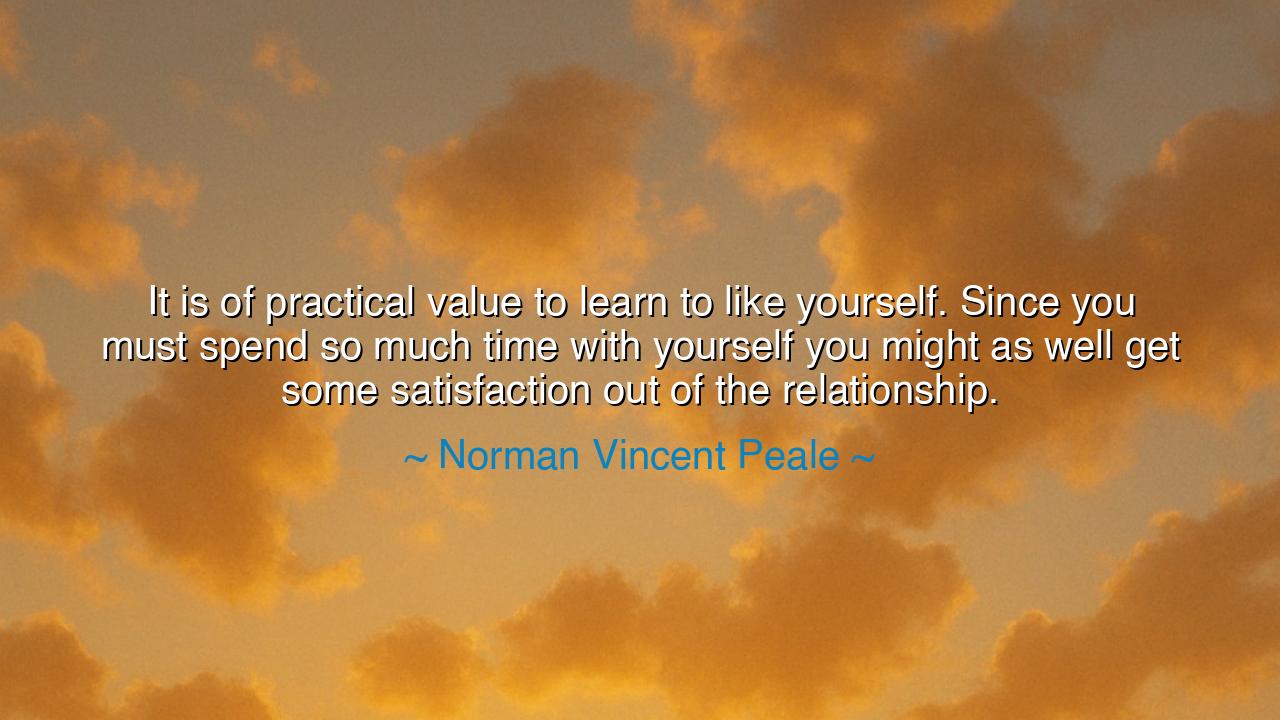
It is of practical value to learn to like yourself. Since you
It is of practical value to learn to like yourself. Since you must spend so much time with yourself you might as well get some satisfaction out of the relationship.






“It is of practical value to learn to like yourself. Since you must spend so much time with yourself you might as well get some satisfaction out of the relationship.” — Thus spoke Norman Vincent Peale, the preacher of optimism and architect of the mind’s renewal. His words carry the fragrance of simple truth, yet beneath their simplicity lies the power to transform a life. For how many among us live at war with ourselves — judging, doubting, condemning the very soul we inhabit? Peale’s wisdom reminds us that self-acceptance is not vanity, but necessity; not self-indulgence, but survival. To make peace with oneself is to find peace with the world.
In these words, Peale speaks not from theory, but from experience born of his lifelong study of human nature. He saw that the greatest enemy of joy is not failure, but self-rejection. The man who despises himself cannot find contentment even in success; the woman who mistrusts her worth cannot find love even when surrounded by affection. Every relationship, every ambition, every act of creation begins and ends with the self. If the heart is filled with self-contempt, all the world will seem hostile. But if one learns to like oneself — not in pride, but in quiet respect — then even solitude becomes a companion, and life’s burdens grow light.
Peale was not the first to see this truth. The ancients taught that to know thyself is the beginning of wisdom — but to like thyself is the beginning of peace. For knowledge without acceptance breeds only despair. The philosopher Marcus Aurelius, emperor of Rome, spent his nights writing meditations not to glorify himself, but to make peace within his own mind. He faced the loneliness of power and the shadows of doubt, yet found solace in understanding that he was but a small part of a vast universe — and that this, too, was enough. His calm was born from acceptance; his strength, from harmony with his own being. He, like Peale centuries later, knew that self-friendship is the foundation of all virtue.
To learn to like oneself is a skill — a discipline of the spirit. It requires patience, honesty, and forgiveness. It means standing before the mirror of truth, seeing both light and shadow, and still saying, “I am worthy of love.” Many fear this, for they believe that liking oneself is arrogance. But arrogance is born of insecurity; true self-liking is humble. It is the recognition that one is imperfect, yet valuable; flawed, yet divine. The one who truly likes themselves does not boast or demand — they simply walk through life with quiet assurance, radiating the strength that comes from inner harmony.
Consider the story of Eleanor Roosevelt, who, in her youth, was told she was plain, timid, and unremarkable. Yet over the years, she transformed herself into a force of compassion and courage, guiding nations through darkness and giving voice to the voiceless. When asked how she overcame her insecurities, she said, “No one can make you feel inferior without your consent.” She had learned, as Peale taught, to befriend herself — to build a relationship with her own heart that no critic could destroy. Her greatness was not born of perfection, but of self-respect. She spent her years in the company of her own spirit — and she found satisfaction there.
Peale’s wisdom, wrapped in humor and practicality, also carries deep spiritual truth. To dislike oneself is to deny the divine image within. Each person, he believed, is a creation of God, and to reject oneself is to reject that creation. Thus, learning to like oneself is not merely emotional hygiene — it is an act of reverence. To treat yourself with kindness is to honor the spark of divinity that dwells in you. And when you do, you naturally extend that same grace to others. The one who has peace within radiates peace without; the one who loves themselves becomes a wellspring of love for the world.
So, my child, take these words to heart: learn to like yourself. Speak gently to your own soul. Do not let the voice of fear or comparison drown out your inner music. You will spend every hour of your life in your own company — learn to make that company kind. Each day, forgive yourself for yesterday’s mistakes, praise yourself for today’s effort, and promise yourself tomorrow’s hope. Walk with yourself as you would with a dear friend — listening, encouraging, believing.
For in the end, as Norman Vincent Peale teaches, the relationship you have with yourself is the foundation of every other relationship in your life. To live in self-hatred is to carry a storm within; to live in self-acceptance is to dwell in sunlight. When you can look upon yourself with compassion and say, “I am worthy, I am loved, I am enough,” then you will have discovered the most practical wisdom of all — that peace begins not in the world around you, but in the heart that beats within your own chest. And from that peace will grow courage, faith, and joy that no darkness can ever diminish.






AAdministratorAdministrator
Welcome, honored guests. Please leave a comment, we will respond soon